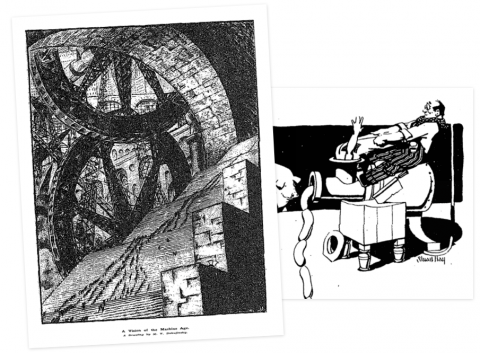NOTE FROM EDITOR: No, you’re not seeing things – we’ve published two blogs on the same topic, at the same time but with one written by a human and another written by AI. Which will perform better? And can you, as the reader, tell the difference? We’ll be releasing the results – including details of our method and control – soon, but for now, enjoy the blog (and don’t forget to drop us a line with your feedback!)
For the last 100 years, newspapers have dined out on the so-called fact that, in time, robots will take our jobs.
In 1921, in particular, there were many illustrations of endless queues of the unemployed and people scared of machinery for this reason.

Even in the 1930s, Albert Einstein weighed in on the debate and blamed machinery for mass unemployment at the time.
However, as time has moved on, so has technology – although the fears of unemployment because of human inventions really haven’t. When we look a bit closer to home, the one we’ve been talking about most recently is the future of content writing.
So, are AI writers going to take our jobs? I’m not so sure.
What are AI writers?
An AI writer, or artificial intelligence writer, is an app that is capable of writing all sorts of editorial content.
It can save time – they were originally used by students struggling to write essays – and can therefore save money. They can be a very practical solution – and an appealing one at that.
Given just a headline, an AI writer can give you a perfectly good blog that’s optimised for SEO, contains not a hint of plagiarism, is 100% factually accurate and, probably most importantly, is completely error-free.
Imagine not having to worry about whether you’re using ‘affect’ or ‘effect’ correctly or if you actually need a comma in the middle of a sentence. Like I said – pretty appealing!
(Should that have been a hyphen…?!)
How does artificial intelligence content writing work?
I think it’s important to first point out that AI-writers don’t actually know what they are talking about. They aren’t futuristic robots with thoughts.
In actual fact, artificial intelligence content writing works through what is known as ‘deep learning’.
Deep learning is a type of machine learning and AI that essentially copies the way that humans gain knowledge; it’s information stacked in a hierarchy that becomes more and more complex. It uses millions of examples of existing content across the web to create its own unique content through natural language processing (NLP).
Now, natural language processing isn’t anything new – spell check is a form of natural language processing, for example – but when used by AI, it becomes more clever.
It’s what helps computers and humans communicate and when it comes to the future of content writing, it’s what helps an article read well, too.
How good are AI writers/content generators?
I’m not going to tell you that AI writers don’t save you time and money, because they can and, in many cases, they do. However, when you dig deep into the world of AI writing, they sometimes just don’t sound natural.
For example, take a look at this AI-written blog by Becoming Human and count how many sentences start with “AI writing”.
Now, if it was me using an AI writer, I wouldn’t necessarily always use the finished content and the *finished content*. Instead, you can use that as a first draft and build off the back of it; for example, ask if it has come up with any suggestions on the topic that you might not necessarily have thought of.
At the end of the day, it depends on the content you are writing before you can analyse how ‘good’ AI writers are. I know that at Hallam, we have had discussions about using AI writers for repetitive product descriptions, for example. This could save us time and our clients money – win, win!
What they are sometimes VERY good at, though, is simply giving you a good laugh.
An AI writer, sometimes known as a ‘bot’, wrote an obituary for Brenda Tent and this was the result:

… and I don’t know how to follow that.
What do humans have over AI writers?
Using the Brenda Tent example, it’s clear that there is no emotion involved in the way they write.
As I explained earlier, AI content generators don’t know what they are writing about so they don’t know how to adapt their tone of voice.
Something we always talk to our clients about as being an important factor when building a connection with their audience is the tone of voice. You take that away and you kind of lose the personability.
Also, remember earlier when I said AI writers are 100% factually accurate? Well, do you always want that to be the case? There is no room for opinion with AI writers.
Using AI writers cuts out a whole host of potential content types – quotes, interviews and anything including unpublished data are a no-go without human intervention, for example.
Will AI replace writers?
I’m no Luddite – I’m not scared that AI will ever fully replace writers in their human form.
I’ve built my career around writing content and I don’t think that there will ever be a time when humans, in some form, aren’t needed to publish high-quality content. However, there is an element of being apprehensive about the future of content writing and the part AI writers will play in that.
Like every piece of technology invented, I think there is a place where AI writers and human writers can work together harmoniously.
I can’t see AI writers being the source of mass unemployment – humans will just have to develop, as we always do!


